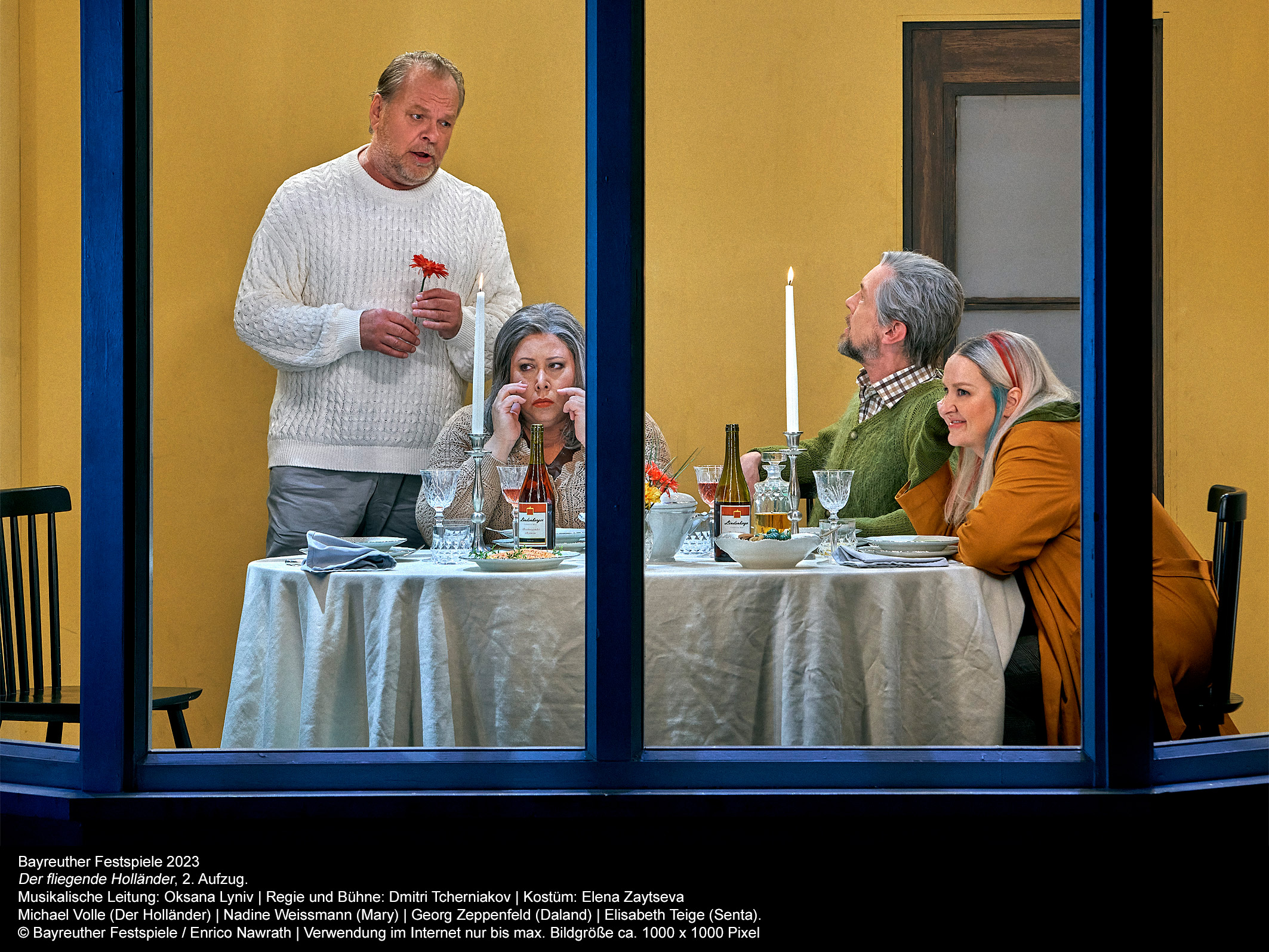
A Flying Dutchman without any ship let alone any sea? A retelling of Wagner’s tale as a son’s revenge on a community that had driven his mother to suicide? Another mother’s killing of a madman who has taken control of the mind of her own rather mad daughter?
Well, a director can take his Der Fliegende Holländer in any number of theatrical many directions: realism, religious or at least moral parable, love story, psychodrama or, as here, a story of unrelenting revenge. This rather gruesome Dmitri Tcherniakov staging, first seen at Bayreuth in 2021, is far from what you may expect and while gorgeously sung and the score played with vitality and power, it does not make for a particularly satisfying experience.
In that vast, sweeping overture a story is told. A child watches as his mother has sex with a man in an alleyway in a Nordic looking modern town; she is shunned by the community, the church, and the man she has loved (or at least had sex with) and her son finds her hanging from a noose from a warehouse hoist.

Our Dutchman (the son) has returned to the village and is half recognised by, Daland, who has been his mother’s “lover”. All of the incredible story telling by the Dutchman happens in a bar where he buys the drinks and is then invited to dine with Daland and his wife Mary.
Sung with gravitas, Nadine Weissmann’s Mary is possibly the only person in this strange grouping that has any understanding of what is going on. She leads the community singing (rather than spinning) and Senta is her wild child who takes over from her mother and stirs up the women until flouncing off as any good teenager would.
Cut to the “Guess Who’s Coming to Dinner” scene which is infuriatingly all performed in a modern conservatory of Daland’s house, the window bars of which block the singers much of the time. Senta falls head over heels for the Dutchman and Mary’s head falls into her hands in despair, realising what this is all going to lead to. Daland just seems more concerned with his bottle of liquor than the fate of his daughter.


In this sinister interpretation there is little to like about the portrayal of the Dutchman. We have a dark and near blood curdling performance by the remarkable Michael Volle, Satan sparking through his voice. Here is a hate and vengeance filled figure who shoots anyone in his way (literally) and burns down the village in his own Gotterdammerung moment. It is only shotgun wielding Mary who guns him down that ends the eternal quest for, well, redemption. The singing is bloody and full of rage. When he enters the town he looks up at where his mother hanged herself when he was a child. No wonder he has his thuggish crew burn the town to the ground.
In what is here a multi layered complex drawing of the role of Daland we have Georg Zeppenfeld who was the perfect balance of a singer and actor who commands a stage. His is a voice made for and adored by Bayreuth audiences and seemingly in whatever role he is cast.
What do you do with poor old Erik? Here Tomislav Mužek looks and sounds the antithesis to the damaged and brooding Dutchman in a handsomely sung excellent performance, his warm tenor voice aching with tenderness and confusion.
The delight of the night? It has to be Elisabeth Teige’s awesome and awe inspiring Senta. Vocally she just has it all and delivered moments that are the stuff of lifelong memory. The audience adored her and so they should. While the characterisation from Tcherniakov gave our Senta some hardly flattering theatrical requirements they were all delivered with panache. Not even permanently moving around cut-out buildings and tables and chairs being lugged around could take away from this fabulous singing. Her Elisabeth in this season’s Tannahuser is also sensational.
Also worthy of note was a beautifully sung and acted Steersman from Attilio Glaser.
Oksana Lyniv conducting gave us a reading of the haunting (and haunted) score that, combined with the delicious Bayreuth Festival Choir, under Eberhard Freidrich, was full of vigour and enthusiasm. This all more than made up for the heavy-handed production. In that invisible pit the orchestra balanced the sweeping richness, the ear for detail, and achieving the overarching atmosphere of foreboding and supernatural.
https://www.bayreuther-festspiele.de/startseite
Tristan und Isolde at Bayreuth Festival:
Doubly surreal Parsifal at Bayrueth Festival:
Tannhauser at Bayreuth Festival: